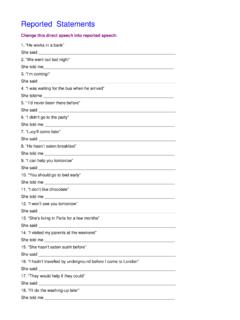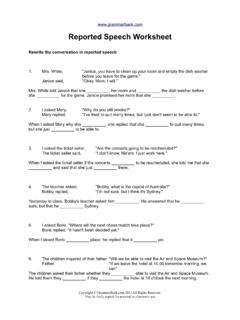Transcription of www.myenglishpages.com Grammar: Reported Speech
1 1 Grammar: Reported Speech Direct Speech vs. Reported Speech : Direct Speech Reported Speech She says: "I like tuna fish." She says that she likes tuna fish. She said: "I'm visiting Paris next weekend" She said that she was visiting Paris the following weekend. Reporting Verbs: If the reporting verb (say, tell, ) is in the present, there is no change in tense although other changes may occur; in the past, tense as well as other changes occur. Direct Speech Reported Speech (no backshift) I write poems. He says that he writes poems. (backshift) I write poems. He said that he wrote poems. Examples: Direct Speech Reported Speech Simple Present He said: "I am happy" Simple Past He said that he was happy Present Progressive He said: "I'm looking for my keys" Past Progressive He said that he was looking for his keys Simple Past He said: "I visited New York last year" Past Perfect Simple He said that he had visited New York the previous year.
2 Present Perfect He said: " I've lived here for a long time " Past Perfect He said that he had lived there for a long time Past Perfect He said: "They had finished the work when I arrived" Past Perfect He said that they had finished the work when he had arrived" Past Progressive He said: "I was playing football when the accident occurred" Past Perfect Progressive He said that he had been playing football when the accident had occurred Present Perfect Progressive He said:"I have been playing football for two hours." Past Perfect Progressive He said that he had been playing football for two hours 2 Past Perfect Progressive He said: "I had been reading a newspaper when the light went off" Past Perfect Progressive He said that he had been reading a newspaper when the light had gone off Future Simple (will+verb) He said: "I will open the door.
3 " Conditional (would+verb) He said that he would open the door. Conditional (would+verb) He said: "I would buy Mercedes if I were rich" Conditional (would+verb) He said that he would buy Mercedes if he had been rich" The verbs could, should, would, might, must, needn't, ought to, used to do not normally change. Example: He said, She might be right. He said that she might be right. Other Changes Direct Speech Reported Speech Time Expressions today that day now then yesterday the day before .. days ago .. days before last week the week before next year the following year tomorrow the next day / the following day Place here there Demonstratives this that these those Reporting Questions transform the question into an indirect question use the question word (where, when, what, how) or if / whether Types of questions Direct Speech Reported Speech With question word (what, why, where, ) "Why" don t you speak English?
4 He asked me why I didn t speak English. Without question word (yes or no questions) Do you speak English? He asked me whether / if I spoke English. 3 Reporting requests / commands When transforming requests and commands, check whether you have to change: pronouns place and time expressions Direct Speech Reported Speech Nancy, do the exercise. He told Nancy to do the exercise. "Nancy, give me your pen, please." He asked Nancy to give him her pen. Tenses are not relevant for requests and commands simply use to / not to + verb (infinitive without "to") For affirmative use to + infinitive (without to) For negative requests, use not to + infinitive (without to).









